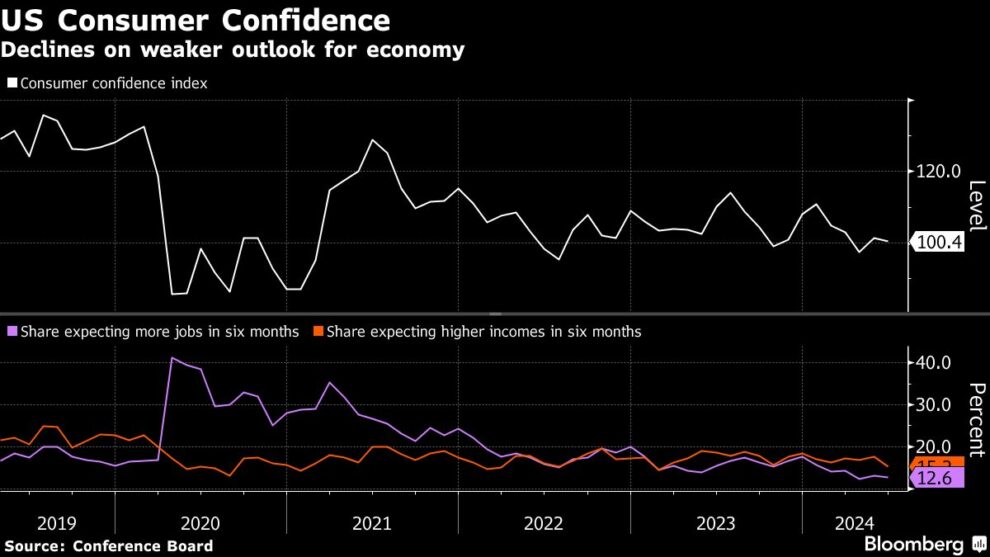
(Bloomberg) — Asia’s stock benchmark swung between gains and losses as markets awaited further catalysts. The Australian dollar strengthened following faster-than-expected inflation data.
Most Read from Bloomberg
Japanese, South Korean and Taiwanese equity gauges rose, while those in mainland China and Australia declined. US stock futures were little changed in Asian trading after a rebound in Nvidia Corp. shares helped boost the S&P 500 on Tuesday.
Australia’s dollar and bond yields climbed after the inflation numbers suggested price pressures remain stubbornly strong and bolstered the case for the central bank to resume raising interest rates. The yen held just below the psychologically important level of 160 per dollar, a breach of which will likely boost intervention concern.
“There’s limited event risk for the broader region today,” said Kyle Rodda, a market analyst at Capital.com. “However, the yen remains within touching distance of 160 and levels that Japanese authorities intervened in the market.”
China’s 10-year bond yield fell to a more than two-decade low as investors flocked to fixed-income securities amid concern about the slowing economy and expectations for further stimulus.
The PBOC once again loosened its grip on the yuan as the currency traded close to the weak end of its fixed daily trading band. The outlook for China’s exports is set to improve, buttressing growth in the world’s second-biggest economy even as consumer spending slows, according to a survey by Bloomberg.
The Bank of Japan is forecast to raise its interest rate in July in addition to unveiling a roadmap for its path toward quantitative tightening, according to one-third of economists in a separate survey by Bloomberg. The next big pain point for the yen may emerge from a readout on the Fed’s favored US inflation gauge on Friday, according to traders.
“Nailing down the details of a cut in bond buying probably won’t be a constraint for a July hike,” Ayako Fujita, chief Japan economist at JPMorgan Securities, wrote in response to the survey. “The cost of postponing the adjustment of excessive monetary easing is rising with the emergence of upside inflation risks.”
Elsewhere in Asia, HSBC lifted its view on South Korean stocks to overweight from neutral, citing “ample growth opportunities in the memory sector and excitement around the ‘Value-Up’ program.”
Extended Rally
In US trading hours Tuesday, a report showed consumer confidence slowed amid a more muted outlook for business conditions, the job market and incomes. Fed Governor Michelle Bowman said she sees a number of upside risks to the inflation outlook. Her colleague Lisa Cook said it will be appropriate to reduce rates “at some point,” adding that she expects inflation to improve gradually this year.
Nvidia climbed roughly 7% after a $430 billion rout. In late trading, FedEx Corp. — a barometer of economic growth — jumped about 15% on a bullish forecast. In other corporate news, Rivian Automotive Inc. surged as Volkswagen AG will invest $5 billion to form a joint venture with the electric-vehicle maker.
Investors are likely to keep piling into US stocks at the sign of any pullback as the Fed edges closer to reducing interest rates, according to Societe Generale SA, which anticipates the easing cycle will begin early next year.
“We believe the bull market we are in isn’t going to be derailed until either we go into recession or the Fed changes interest-rate policy from potential cuts to actual hikes,” said Chris Zaccarelli at Independent Advisor Alliance. “Expect volatility between now and the end of the year, but don’t expect the bull market to end without a change in the economy or Fed posture.”
In commodities, oil held a decline after an industry report signaled a small build in US crude inventories ahead of official government data.
Key events this week:
-
US new home sales, Wednesday
-
China industrial profits, Thursday
-
Eurozone economic confidence, consumer confidence, Thursday
-
US durable goods, initial jobless claims, GDP, Thursday
-
Nike releases earnings, Thursday
-
Japan Tokyo CPI, unemployment, industrial production, Friday
-
US PCE inflation, spending and income, University of Michigan consumer sentiment, Friday
-
Fed’s Thomas Barkin speaks, Friday
Some of the main moves in markets:
Stocks
-
S&P 500 futures were little changed as of 12:50 p.m. Tokyo time
-
Nikkei 225 futures (OSE) rose 1.6%
-
Japan’s Topix rose 0.7%
-
Australia’s S&P/ASX 200 fell 0.8%
-
Hong Kong’s Hang Seng was little changed
-
The Shanghai Composite fell 0.3%
-
Euro Stoxx 50 futures rose 0.4%
Currencies
-
The Bloomberg Dollar Spot Index was little changed
-
The euro was little changed at $1.0711
-
The Japanese yen was little changed at 159.82 per dollar
-
The offshore yuan was little changed at 7.2930 per dollar
Cryptocurrencies
-
Bitcoin was little changed at $61,958.86
-
Ether fell 0.4% to $3,395.15
Bonds
-
The yield on 10-year Treasuries advanced one basis point to 4.26%
-
Japan’s 10-year yield advanced 1.5 basis points to 1.010%
-
Australia’s 10-year yield advanced 12 basis points to 4.32%
Commodities
This story was produced with the assistance of Bloomberg Automation.
–With assistance from Rob Verdonck.
Most Read from Bloomberg Businessweek
©2024 Bloomberg L.P.






